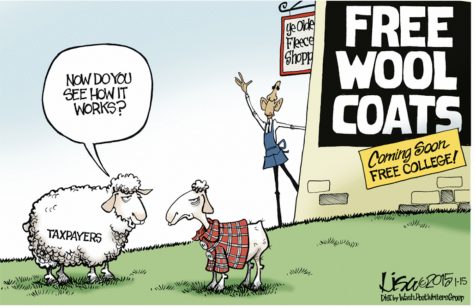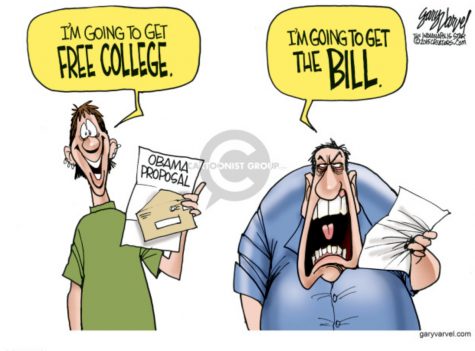Gov’t-Funded College (Con): Not the Promised Silver Bullet
A September 2017 poll conducted by Morning Consult indicated that a plurality of Republicans support a government-backed free public college policy, with 47% for and 45% against. Even among self-identified Tea Party backers, support for the policy appears strong, with 50% in favor and 49% against. This poll, especially when compared with other polls indicating strong support among Democrats and Americans in general for free college, seems to make clear that free college is the future.

But the hard fact of the matter is that free college has not been considered beyond the material and economic gains the policy would bring. And while those gains are significant—there is an argument for breaking the poverty cycle and optimizing our economy for the rise of robotics—they do not take into account the frightening ethical problems that come with handing majority funding, and thus majority control, of America’s higher education system to the national government. Both Republicans and Democrats should be alarmed by the idea of letting a volatile, partisan body dictate America’s public college system.

First, it must be made clear exactly what Democrats mean when discussing free college. Senator Bernie Sanders (I-VT) introduced the Free College for All Bill on April 3rd, 2017, which requires that public education funding be made free to middle-and-lower-class state residents. A full 67% of the cost for each state would be shouldered by the federal government, resulting in costs north of $47 billion a year, paid for by a tax hike on Wall Street investments, according to CNN. Such a deterrent to investments reduces confidence in the economy and checks the power of individuals to invest in the economy, causing more long-term damage that will ultimately reduce federal revenue. The stock market is at an all-time high and unemployment is at an all-time low thanks to conservative policies allowing the economy to run at full speed, benefitting all Americans, according to the Heritage Foundation. A tax hike dissuading investment and threatening this healthy growth is the worst policy the federal government could implement right now. And, even with the tax hike, more spending and a bigger federal government is the last thing America needs at a time when the national debt stands at over $21 trillion (placing the burden on the average American family at over $300,000 in long-term costs). A growing economy means more jobs and higher wages, allowing more to attend college without driving up the deficit.
The economic consequences of free college are undesirable; the ethical effects are Orwellian. Anyone with knowledge of how private business works knows the power of the purse: CEOs are hostages of the shareholders that provide funding for the company. The same trend is visible in government. Congress has forced federal policy on states and individuals in the past through the withholding of funding, and there is nothing stopping Congress from exercising undue influence on what should be a localized education system. It is a core tenet of federalist principles that America was founded on that the government closest to the people knows best; allowing the national government to fund the majority of public college violates that principle.
If the federal government is allowed majority stake in public education, just one radical Congress could ruin the educational integrity and the commitment to free thought that our education system stands for. What if Congressional Republicans manipulate curriculum to have a conservative slant, or, worse, outright abolish consistently liberal-professor dominated majors like anthropology and gender studies? What if a future government responds, for example, to the rise of the alt-right by handicapping education about fascism in public universities in a short-sighted attempt to stop a problem by repression?
There is no doubt that education is something to be strived for–I want a future where every American has a college education–but trying to spend our way out of the problem isn’t a healthy solution. Placing the authority to fully fund our public education system in such a distant, impersonal body is a recipe for infringement of federalism and academic integrity. State governments, closer to the people they govern, are less prone to such partisanship. The federal government, sensitive to partisanship, has placed political points before educational prowess twice in the last eighteen years. Bush the younger enacted No Child Left Behind and Obama saw Common Core passed, both of which took curriculum authority away from the states and failed American students. There is no reason to suspect that the national government would not extend such rashness to higher education if given full control. One would be a fool to sacrifice higher education and jeopardize the future of the nation for a free bachelor’s degree.
Whom do you agree with on the topic of public universities being tuition free?
- Jack Covert (70%, 16 Votes)
- Ben Feinstein (30%, 7 Votes)
Total Voters: 23

Ben Feinstein is a proud American, a history buff, and a debate and international affairs writer for The Keynote. He plans to serve in the government...

